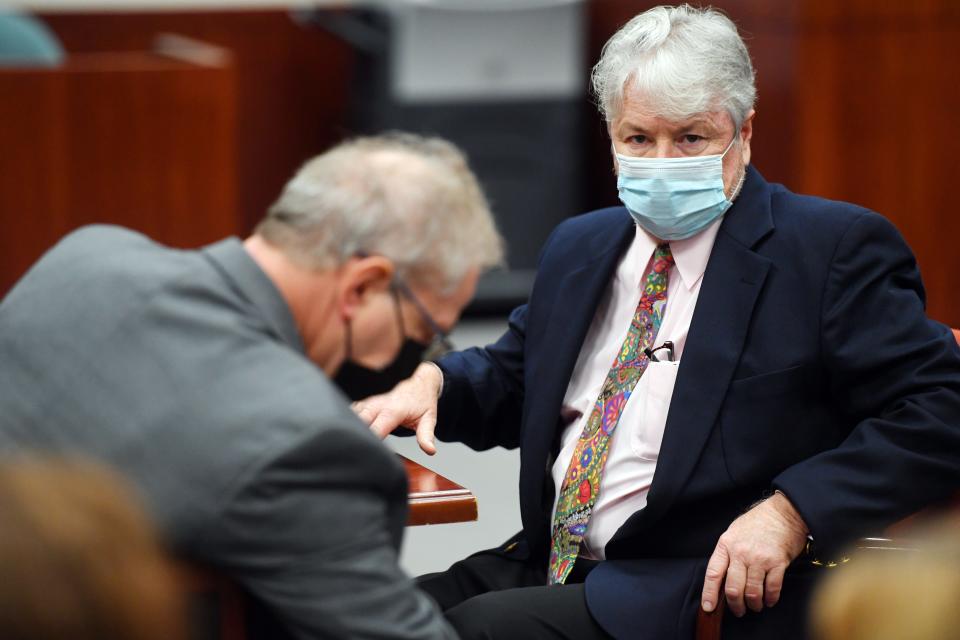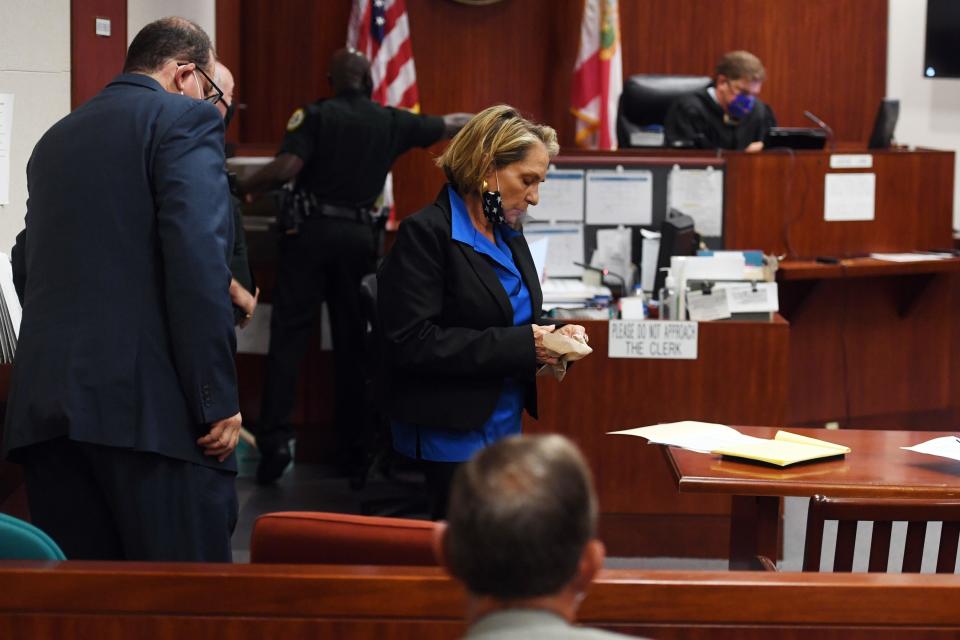Warning from judge; Sebastian case shows sunshine law has consequences for regular people
The following is an edited version of a concurring opinion issued April 12 by Judge Cory J. Ciklin of the Fouth District Court of Appeal, West Palm Beach, in the cases of former Sebastian City Council members Damien Gilliams and Pamela Parris. It is published by us as a public service in an effort to educate public officials and prevent future Sunshine Law violations.
It is important ... to issue a clarion call to the hundreds of Florida public officials who are subject to the Florida Sunshine Law. Indeed, as more and more individuals become Floridians and engage in civic involvement, our new citizens need to be fully aware of Florida’s Sunshine Law.
The appellate briefs filed in this case suggesting that the Sunshine Law is vague and unclear or that the law is weak and unprovable have given me pause and a commensurate urge to raise a warning flag. It has been many years since a comprehensive opinion has been issued by a Florida intermediate appellate court on the subject and, thus, perhaps this admonition is particularly timely.
It seems unlikely, in this unfortunate series of events, that former Sebastian City Councilmembers Pamela Parris and Damien Gilliams would have ever thought it imaginable that they would now be appealing criminal convictions for which they have been sentenced to serve jail time of two months and six months, respectively. My guess is, that in retrospect, they would have run away and resisted any temptation to get caught up in the excitement of the moment ... as, unfortunately, they ultimately did.
These recent Indian River County Sunshine Law prosecutions and convictions illustrate actual examples of popularly elected local governing body officials being ordered to do real jail time in a real Florida county jail for the commission of a real Florida crime.
Of course, whether elected or appointed is of no consequence. The Florida Sunshine Law applies equally to all.
After now engaging in significant research on the law itself, plus sitting for oral argument on the topic in January, I have developed a concern that some government officials subject to the Sunshine Law may not fully appreciate the Law’s meaning and/or the possible criminal penalties that lie in wait for those who carelessly fail to fully comprehend the Sunshine Law and abide by it.

And this baffling complacency is not for want of official publications — including the current 360-page Government-In-The-Sunshine manual prepared by the Florida Attorney General. To be sure, the briefings in these consolidated cases, and our majority opinion are considerably lengthy because the issues are complex and yet, paradoxically, not all that difficult to understand.
The scenario in this case is alarming. Three duly elected members of the Sebastian City Council who were not allowed to privately discuss foreseeable government issues did so anyway. They decided amongst themselves — as their personal protest to the mayor and city manager’s decision to cancel a regularly scheduled city council meeting because of COVID — to enter the city council chambers and conduct the cancelled meeting anyway.
Armed with a government-issued pass key, and in unlit city council chambers, these three city councilmembers took to the dais and purported to take official action at what in essence became a spontaneous, non-announced meeting of the three of them that lasted until the police showed up. That imprudent action was itself a flagrant violation of the Sunshine Law and a reading of the statute makes this conclusion abundantly clear.
Whether two or more officials privately discuss, in any manner whatsoever, a foreseeable issue of any magnitude, inside the other’s office or at a coffee shop or in the spectator audience of a child’s soccer match or at a statewide education conference or by quick text or whether they do so through surrogates (such as aides, friends, relatives, other government officials) or whether, as in this case, they decide to spontaneously convene an unannounced rally or meeting, so long as two or more are involved, these are all distinctions without a difference.

And every individual unauthorized private discussion between two or more officials along the way constitutes an individual statutory crime against each person with each separate charge carrying a possible penalty of 60 days in the county jail. Plus a $500 fine. Plus substantial court costs. Plus six months of probation. Per act.
And notably, in the state of Florida, no statutory sentencing guidelines exist for these types of crimes and consecutive jail sentences and consecutive probationary periods are permitted and within the unfettered discretion of the trial judge.
Even though ample publications, and just as many available seminars, meetings, discussions, and groups, are specifically charged with fully educating officials subject to the Sunshine Law (which, ironically all three charged city councilmembers attended), here are my very easy takeaways from the current state of the Florida Sunshine Law.
Meetings of two or more fellow government officials who are subject to the Sunshine Law are not allowed if any words of any type pertaining to any possible foreseeable issue will be communicated in any way unless they are open to the public to whom reasonable notice has been provided.
There is rarely any purpose for a private meeting or communication between two or more government officials who are both are subject to the Sunshine Law. Those who engage in such activity widely open themselves to allegations that some aspect of the governmental decisional process has unlawfully occurred behind closed doors. Any aspect of the decisional process — ranging from whether to conduct a meeting in the first instance to the concept of terminating administrative staff to the seemingly inane decision as to which government officials will even make a motion to begin open public discussion — is part of the official decisional process and must be wide-open and advertised in advance to the public.
Under Florida law, there is no such thing as an “informal” conference or “unofficial” caucus or pass-you-in-the-hallway information gathering (or sharing) by two or more government officials subject to the Sunshine Law which would thereby remove such communication from the Sunshine Law’s ambit. Indeed, such “innocuous” meetings have been held to be illegal and nothing short of the unlawful crystallization of secret decisions to a point just short of public discussion and ceremonial acceptance. And whether done personally or through surrogates (such as aide-to-aide), such meetings are illegal under Florida’s Sunshine Law.
Any attempt to distinguish between a “formal,” “informal,” “ministerial,” “informational gathering-only,” or “just a listening” meeting between two or more government officials — for purposes of determining whether the Sunshine Law applies — is by itself alien to the law’s design, exposing it to the very evasions which it was designed to prevent.
Because a violation of Florida’s Sunshine Law can be investigated and charged as a crime, all of those law enforcement and prosecutorial techniques, such as the issuance of subpoenas for cell phone records is but a signature away. In these cases, prosecutors easily gathered data and produced it for the jury showing numerous texts, emails, telephone conversations and voicemails over a wide-ranging period between all three city councilmembers. The flow chart prepared by the prosecution and shown to the jury highlighted the dates of the calls, to whom they were made, the duration of the calls and the overall sequence of communications.
When in any doubt, as to whether a meeting or communication, either directly or indirectly between two or more government officials may be illegal under the Sunshine Law, the easy answer is: “LEAVE.” See City of Miami v. Berns, 17 245 So. 2d 38, 41 (Fla. 1971) (“The evil of closed door operation of government without permitting public scrutiny and participation is what the law seeks to prohibit. If a public official is unable to know whether by any convening of two or more officials he is violating the law, he should leave the meeting forthwith.”).
Lying, under oath, about any matter that is material to an alleged Sunshine Law violation is considered as an additional crime of perjury and every individual lie constitutes an individual statutory crime against each person with each separate charge carrying a possible penalty of one year in the county jail. Plus a $1,000 fine. Plus substantial court costs. Plus 12 months of probation. Per lie. And just as is the case with the underlying Sunshine Law crime, no statutory sentencing guidelines exist for this type of crime in Florida and thus consecutive jail sentences and consecutive probationary periods are permitted and within the trial judge’s unfettered discretion.
This article originally appeared on Treasure Coast Newspapers: Judge: Sebastian case shows jail likely in sunshine law violations

